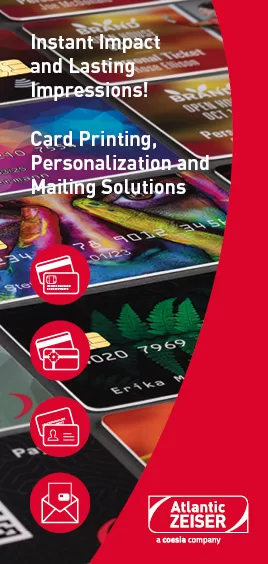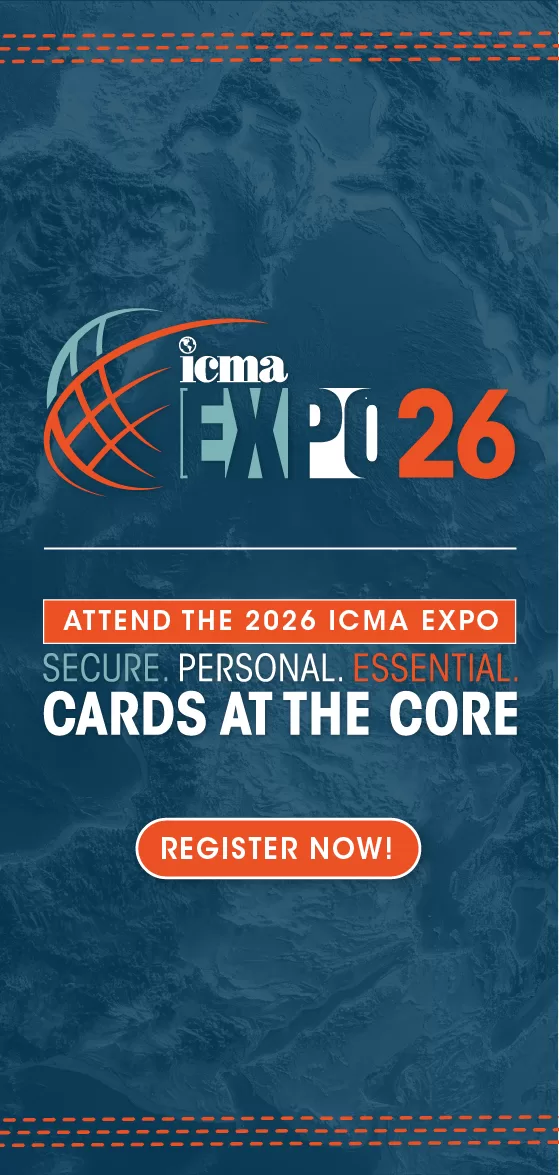
by Jennifer Kohlhepp | CM Magazine Featured
ICMA Founder Emeritus Al Vrancart Set to Retire
 By Jennifer Kohlhepp, Managing Editor, ICMA
By Jennifer Kohlhepp, Managing Editor, ICMA
Al Vrancart remains amazed at how the global card industry has continued to evolve since the day he joined its trajectory more than 30 years ago.
Back then, he went to a tradeshow where people wore badges boasting, “Wipe the Stripe,” in support of chip cards replacing magnetic stripe cards.
“We all know how that worked out,” Vrancart quipped. “It’s amazing the staying power that plastic cards have had, and they are still going strong.”
“Our card industry produces billions and billions of promotional, loyalty and gift cards, which are very slowly being displaced by digital cards and apps,” he continued. “However, these cards will continue to remain appealing for years for many consumers. The focus has always been on payment cards because of the staying power of financial brand issuers like Visa, Mastercard and American Express, and although they like to tout the latest technologies, everything still remains centered around the plastic card.”
Vrancart, who plans to retire on December 31, 2021, is celebrated today for his staying power, hard work, dedication and thought leadership in the global card industry. He joined the industry (after 18 years with Philips Lighting in Australia, South Africa, Canada and the United States) as president/CEO of NBS Card Services in 1989 to strategically develop and position the card manufacturing business into a Tier One level in North America. He held the position for 15 years until 2004. Along the way, he developed and launched the world’s first metalized foil cards, which became an NBS patent, and launched the first ecofriendly biodegradable transaction card in North America in 1993.
Inspired by the global lighting industry, which had seen several associations coalesce over the years, Vrancart and former Philips’ colleague Jeffrey Barnhart saw an opportunity to do the same in the global card industry. Together, they initiated an outreach program to encourage card manufacturers to join the International Card Manufacturers Association (ICMA). The duo organized a meeting in early 1990 in Newark, New Jersey, with some potential members and founded ICMA.
“There were nearly 500 card manufacturing facilities globally and none of them were really having any communication or sense of belonging to an industry,” Vrancart said. “There was severe competition and some degree of—for lack of a better word—infighting among the competitors. Competitors weren’t working together for the betterment of the industry. Our industry needed an association to move ahead, and the founding of ICMA allowed our industry to move ahead.”
ICMA developed a responsive Global Board of Directors, which frequently met and communicated to drive ICMA growth initiatives. “I became the first president of the ICMA and was voted in as ICMA founder emeritus,” Vrancart said. “We launched our first ICMA EXPO in Orlando, Florida in 1990.”
ICMA then expanded the EXPO outside of the United States to several locations in Europe, Canada, Mexico and Bermuda. Today, ICMA has 200 members across the globe. Barnhart serves as executive director while Vrancart has been providing strategic direction and program development to grow and enrich membership benefits.
Throughout his 32-year tenure, Vrancart has supported ICMA with the following:
- Global Card Manufacturing & Personalization Market Statistics Reports (for more than 25 years)
- Card Industry Facts & Figures for ICMA.com
- ICMA EXPO and CardTREX agenda development
- Roundtable discussions at ICMA events
- Élan Awards of Excellence content development and judging
- EcoLabel program
- InBrief (weekly industry newsletter)
- Task Force development
- Advanced Card Education (ACE) content development
- New membership initiatives
- Card Manufacturing magazine content
- Webcasts (particularly focused on market statistics and trends)
“Our association is all about education, networking…and making the card industry a friendlier place to work and compete,” Vrancart said.
When asked if the association has achieved the goals it was founded upon, he said, “Well, we certainly got quite far but there’s always work to be done. Trying to get new members to see the value and benefits we offer—it’s a story that doesn’t end, but we are globally recognized. Everyone knows who ICMA is—it’s a matter of getting more people to join and participate so the industry is better for everyone.”
Vrancart will miss the camaraderie ICMA generated. “To pick up the phone and call a member to ask them about something related to the card industry and get an answer, being with competitors on a friendly basis, is very important,” he said.
He will also miss traveling the world to help grow the association. “We’ve been on almost every continent and certainly have members in every region of the world,” Vrancart said. “I find it invigorating! It’s great seeing all that we do here in the United States from different perspectives in other parts of the world. As Americans, it’s important to understand that. The globalization is extremely important.”
Vrancart credits the hard work and dedication of various people—past and present—with ICMA’s continued success. “It should never go unnoticed,” he said. “People did more than expected to make ICMA more than a success. Everyone on the ICMA team loves it and enjoys their job. They aren’t just coming in and doing something mundane. There is always something attractive about being on the ICMA team.”
“I wish I could call out all of the names of the people I really have enjoyed working with—all of the people who had anything to do with ICMA—from internal team members to ICMA members to associate members and all of the relationships built with suppliers and vendors and the customer base who frequently attended our events,” Vrancart continued. “The support we always got from our sponsorships that we would count on year after year were also very important.”
“I would also like to thank Jeff Barnhart, our ICMA executive director and founder, who took a huge risk in backing the development of our global association through his association management and marketing company—CMA,” Vrancart said.
While Vrancart sees technology changing, he doesn’t see it replacing plastic cards any time soon. “No, I think they’ll be around. There’s a lot of runway left in cards. Specific market segments continue to be in demand; it depends on the region. The Asia Pacific region is moving fast to replace cards with newer technologies, but the other regions are not moving so fast. Every region in the 12 vertical markets has its own story for how long the runway is for them.”
Vrancart looks forward to retirement. “I have worked every day for 65 years since I was 11 years old starting with my paper route in London, Ontario, Canada,” he said. “I’ll be 76 years old. I plan to spend more time with my family, on my hobbies, relaxing and reading the Wall Street Journal from cover to cover every day because previously I only had time to look for the excerpts that pertained to our industry.”





